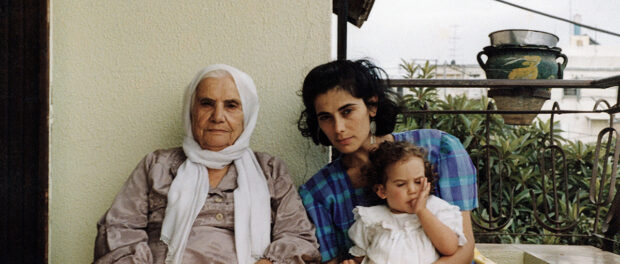Review: Bye Bye Tiberias
Timing is everything. Lina Soualem’s family portrait featuring four generations of Palestinian women couldn’t be making its way around the festival circuit at a more appropriate time. Although some might say it is the least appropriate, given that a now polarized world is witnessing a terrible moment in history for Palestinians and Israelis alike. However, by focusing on the personal experience, the film’s messages are less about the historic events related to Israel and Palestine’s ongoing conflicts, and more pointed towards the circumstances of refugees, emigrés, immigrants, and displaced families everywhere. For those of us with the good fortune and luxury to inhabit a stable country, the film reminds us that every single person that makes up the eye popping statistics concerning refugees and the displaced (110 million forcibly displaced according to the UN 2022 Refugee Data Finder) is an individual with dreams, relationships, hopes, sorrows, a culture, and a story as rich as any other human on the planet at any point in time.
The film focuses on Soualem’s mother, Hiam Abbass, who left home partially for love, partially for her acting career, but mostly because she felt “suffocated” in the Palestinian village and traditions she grew up in. Expectations for marriage and career lead to Abbass’ escape and voluntary exile, but it is the birth of her daughter Lina, that brings her back to Deir Hanna near Lake Tiberias. This return ends a years’ long family rift and provides Soualmen a starting point for examining other departures and renuions experienced by her family over generations.
Abbass’ words and archival film allows Soualmen to go back to the time of the Nakba (“the catastrophe” of 1947-8, when 700,000 Palestinians were displaced — a side by side comparison of two very different narratives of history can be found HERE). Soualem’s great grandfather, a farmer, dies from a broken heart after losing his animals and farm. His resilient wife, Um Ali, settles the family of eight children in Deir Hanna and supports them with just a sewing machine. Of the eight, one of the sisters crosses the mountains to become a stateless person in the refugee camps of Syria. Only by sneaking over the border does she reunite with her family, decades after the initial displacement. Another of the children, Nemat, Abbass’ mother, grows up in Deir Hanna and overcomes major obstacles to become a teacher while raising 10 children. These now-grown children, who include Soualmen’s mother, are reunited in the film and they pour over photos and letters from the past together.
Beyond themes of departures — some voluntary, some not, the importance of home and family, and especially the significance of women and subsequent generations are explored in this sentimental piece. The men of the family are given a back seat to the lives of strong women. Old fights are viewed with softer eyes than they must have been in the moment of occurrence (in particular, Abbass re-enacts the confrontation she had with her father prior to leaving Deir Hanna). Nonetheless, the film returns to its key theme that no matter what the circumstances and no matter what obstacles and life changes are encountered, a connection to family serves as a source of strength and meaning.
Accompanying Bye Bye Tiberias was the 20 minute short D’Ici, D’Ailleurs directed by Chadi Bennani. This ideal pairing for Bye, Bye Tiberias looks at how the children of immigrants adjust and adapt to life in their new country. In particular, a group of 16-year-old Quebec classmates who come from Benin and Syria probe themselves and even their parents as to what it means to have not just dual identities, but identities that seem to belong to neither the home country nor Quebec. No question and no discussion is off the table as they discuss topics ranging from language and food to racism and sexism. The considerations show a depth and maturity about the difficulty and pleasure of possessing a complex identity.
Bye Bye Tiberias and D’ici, D’ailleurs are both part of the RIDM festival, held in Montreal until November 26. Details on films and tickets can be found HERE.






